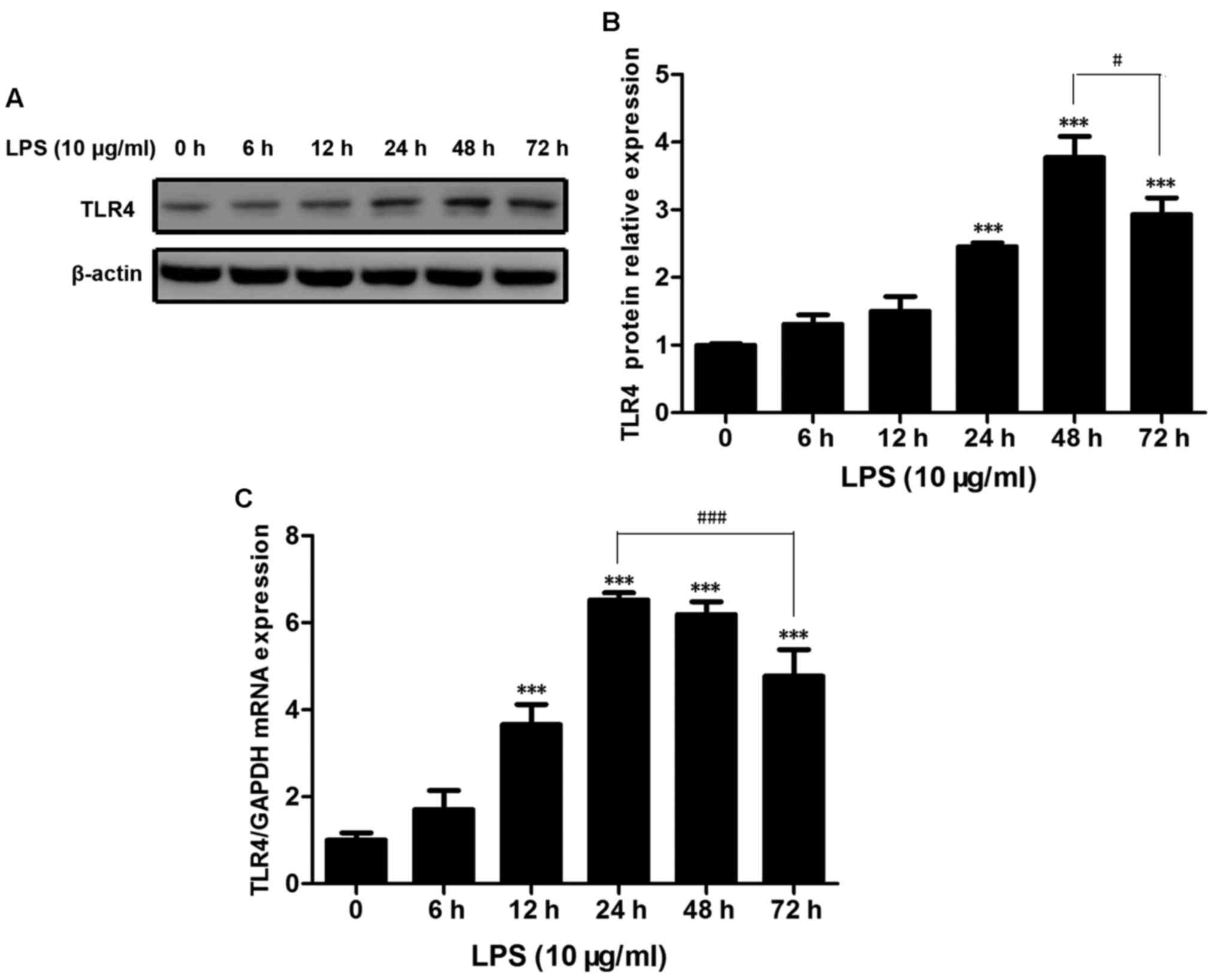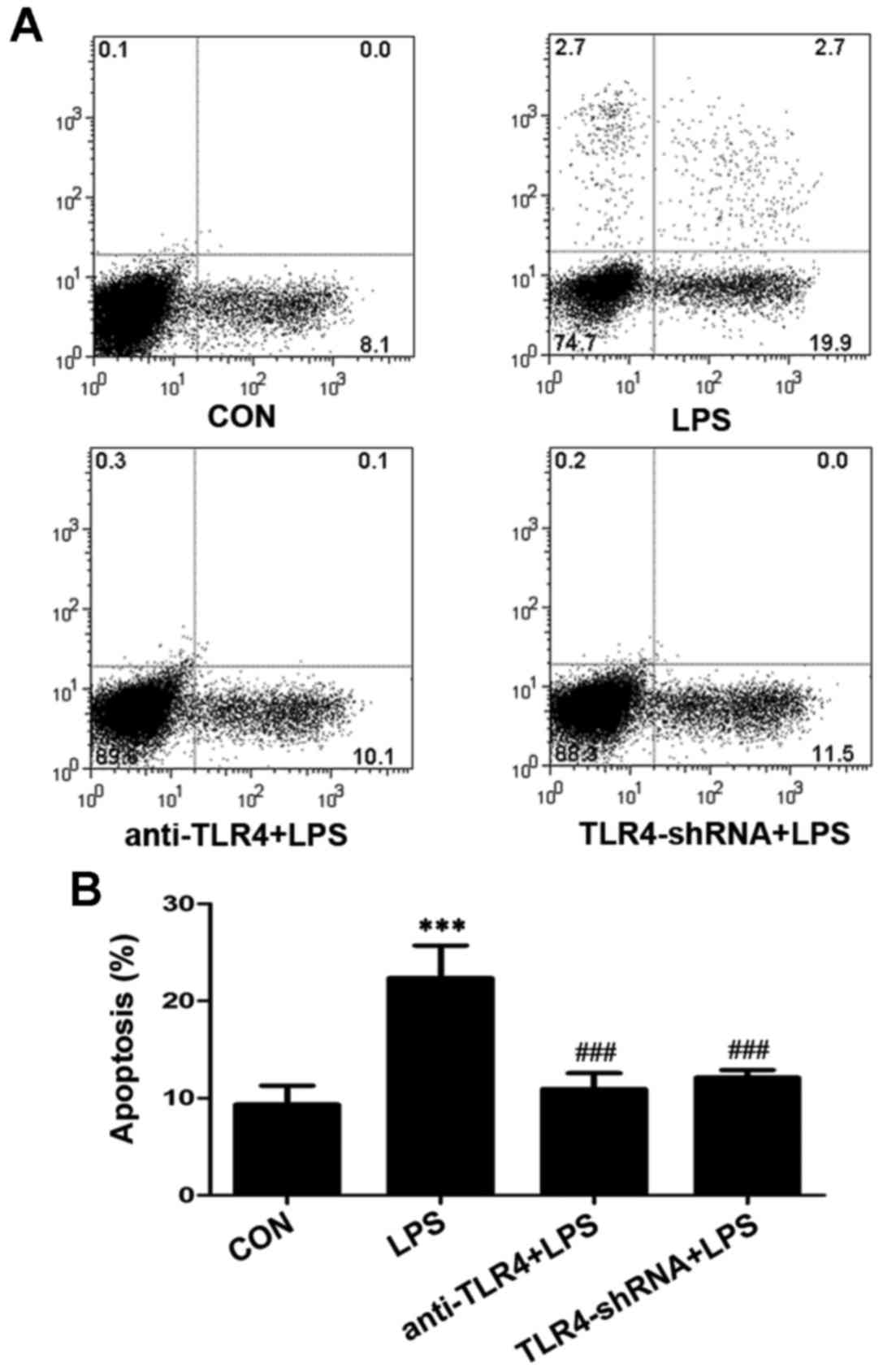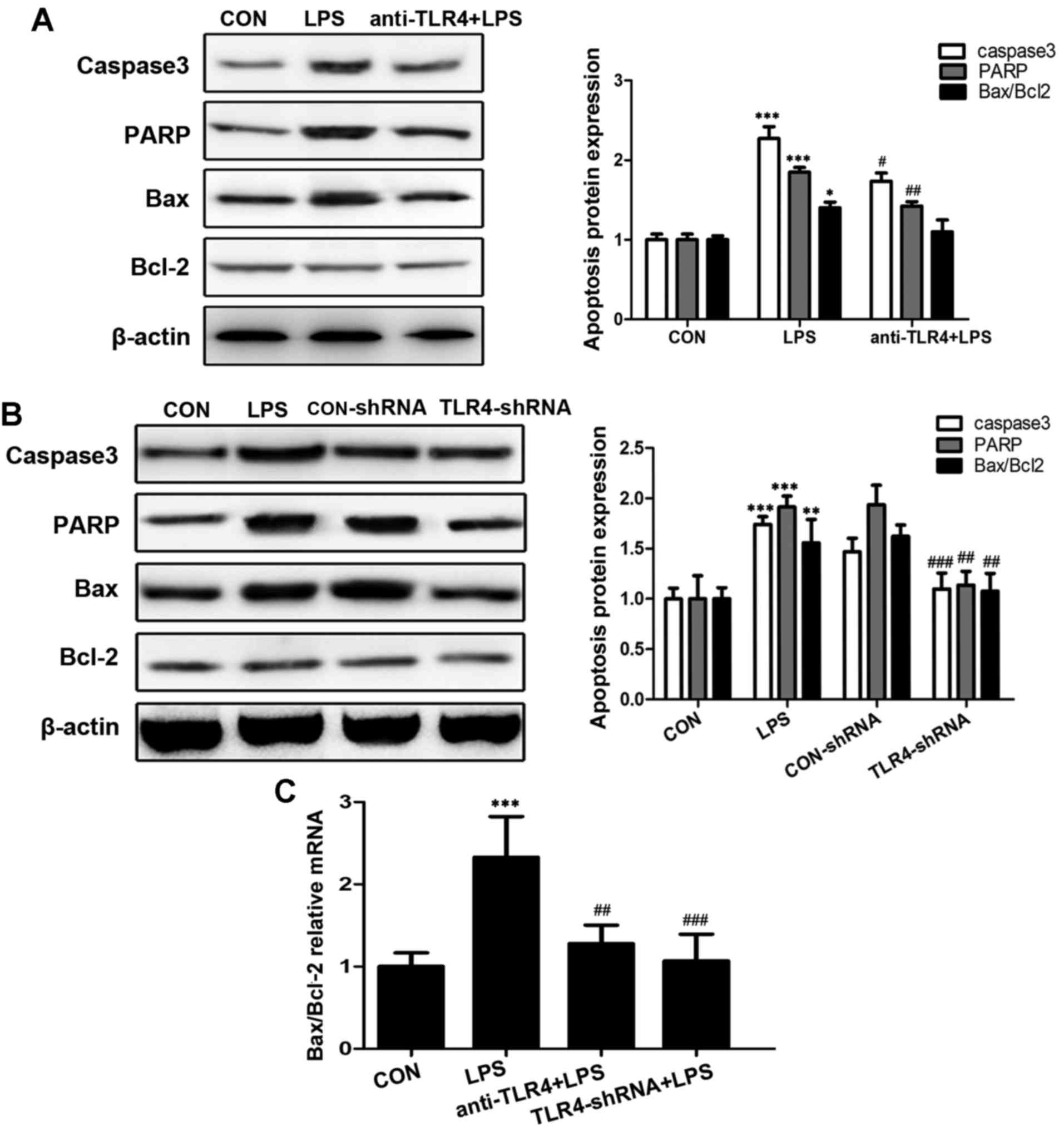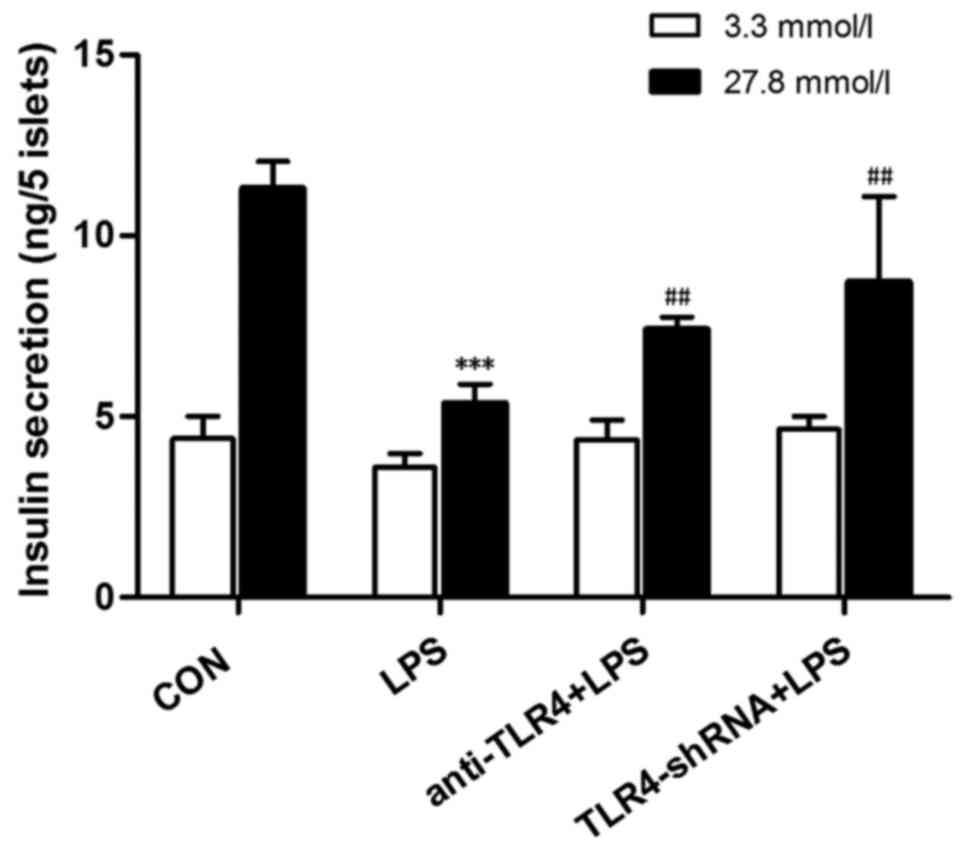|
1
|
Beutler B and Rietschel ET: Innate immune
sensing and its roots: The story of endotoxin. Nat Rev Immunol.
3:169–176. 2003. View
Article : Google Scholar : PubMed/NCBI
|
|
2
|
Zahar JR, Timsit JF, Garrouste-Orgeas M,
Français A, Vesin A, Descorps-Declere A, Dubois Y, Souweine B,
Haouache H, Goldgran-Toledano D, et al: Outcomes in severe sepsis
and patients with septic shock: Pathogen species and infection
sites are not associated with mortality. Crit Care Med.
39:1886–1895. 2011. View Article : Google Scholar : PubMed/NCBI
|
|
3
|
Giribabu N, Kumar KE, Rekha SS, Muniandy S
and Salleh N: Chlorophytum borivilianum root extract maintains near
normal blood glucose, insulin and lipid profile levels and prevents
oxidative stress in the pancreas of streptozotocin-induced adult
male diabetic rats. Int J Med Sci. 11:1172–1184. 2014. View Article : Google Scholar : PubMed/NCBI
|
|
4
|
Coskun O, Kanter M, Korkmaz A and Oter S:
Quercetin, a flavonoid antioxidant, prevents and protects
streptozotocin-induced oxidative stress and beta-cell damage in rat
pancreas. Pharmacol Res. 51:117–123. 2005. View Article : Google Scholar : PubMed/NCBI
|
|
5
|
Du SC, Ge QM, Lin N, Dong Y and Su Q:
ROS-mediated lipopolysaccharide-induced apoptosis in INS-1 cells by
modulation of Bcl-2 and Bax. Cell Mol Biol (Noisy-le-grand). 58
Suppl:OL1654–OL1659. 2012.PubMed/NCBI
|
|
6
|
Medzhitov R: Toll-like receptors and
innate immunity. Nat Rev Immunol. 1:135–145. 2001. View Article : Google Scholar : PubMed/NCBI
|
|
7
|
Reyna SM, Ghosh S, Tantiwong P, Meka CS,
Eagan P, Jenkinson CP, Cersosimo E, Defronzo RA, Coletta DK,
Sriwijitkamol A and Musi N: Elevated toll-like receptor 4
expression and signaling in muscle from insulin-resistant subjects.
Diabetes. 57:2595–2602. 2008. View Article : Google Scholar : PubMed/NCBI
|
|
8
|
Shi H, Kokoeva MV, Inouye K, Tzameli I,
Yin H and Flier JS: TLR4 links innate immunity and fatty
acid-induced insulin resistance. J Clin Invest. 116:3015–3025.
2006. View
Article : Google Scholar : PubMed/NCBI
|
|
9
|
Li M, Song L, Gao X, Chang W and Qin X:
Toll-like receptor 4 on islet beta cells senses expression changes
in high-mobility group box 1 and contributes to the initiation of
type 1 diabetes. Exp Mol Med. 44:260–267. 2012. View Article : Google Scholar : PubMed/NCBI
|
|
10
|
Cucak H, Mayer C, Tonnesen M, Thomsen LH,
Grunnet LG and Rosendahl A: Macrophage contact dependent and
independent TLR4 mechanisms induce β-cell dysfunction and apoptosis
in a mouse model of type 2 diabetes. PLoS One. 9:e906852014.
View Article : Google Scholar : PubMed/NCBI
|
|
11
|
Wang Y: Attenuation of berberine on
lipopolysaccharide-induced inflammatory and apoptosis responses in
β-cells via TLR4-independent JNK/NF-κB pathway. Pharm Biol. Nov
5–2013.(Epub ahead of print).
|
|
12
|
Livak KJ and Schmittgen TD: Analysis of
relative gene expression data using real-time quantitative PCR and
the 2(−Delta Delta C(T)) method. Methods. 25:402–408. 2001.
View Article : Google Scholar : PubMed/NCBI
|
|
13
|
Hotamisligil GS: Inflammation and
metabolic disorders. Nature. 444:860–867. 2006. View Article : Google Scholar : PubMed/NCBI
|
|
14
|
Yoneyama S, Terashima H, Yamaguchi R,
Tadano S and Ohkohchi N: The manner of the inflammation-boosting
effect caused by acute hyperglycemia secondary to overfeeding and
the effects of insulin therapy in a rat model of sepsis. J Surg
Res. 185:380–387. 2013. View Article : Google Scholar : PubMed/NCBI
|
|
15
|
Viana MV, Moraes RB, Fabbrin AR, Santos MF
and Gerchman F: Assessment and treatment of hyperglycemia in
critically ill patients. Rev Bras Ter Intensiva. 26:71–76. 2014.(In
Portuguese). View Article : Google Scholar : PubMed/NCBI
|
|
16
|
Muhl D, Woth G, Drenkovics L, Varga A,
Ghosh S, Csontos C, Bogár L, Wéber G and Lantos J: Comparison of
oxidative stress & leukocyte activation in patients with severe
sepsis & burn injury. Indian J Med Res. 134:69–78.
2011.PubMed/NCBI
|
|
17
|
Ling PR, Smith RJ and Bistrian BR: Acute
effects of hyperglycemia and hyperinsulinemia on hepatic oxidative
stress and the systemic inflammatory response in rats. Crit Care
Med. 35:555–560. 2007. View Article : Google Scholar : PubMed/NCBI
|
|
18
|
Henriksnas J, Lau J, Zang G, Berggren PO,
Kohler M and Carlsson PO: Markedly decreased blood perfusion of
pancreatic islets transplanted intraportally into the liver:
Disruption of islet integrity necessary for islet
revascularization. Diabetes. 61:665–673. 2012. View Article : Google Scholar : PubMed/NCBI
|
|
19
|
Zhu HQ, Gao Y, Guo HR, Kong QZ, Ma Y, Wang
JZ, Pan SH, Jiang HC and Dai WJ: Pretreatment with bilirubin
protects islet against oxidative injury during isolation and
purification. Transplant Proc. 43:1810–1814. 2011. View Article : Google Scholar : PubMed/NCBI
|
|
20
|
Armann B, Hanson MS, Hatch E, Steffen A
and Fernandez LA: Quantification of basal and stimulated ROS levels
as predictors of islet potency and function. Am J Transplant.
7:38–47. 2007. View Article : Google Scholar : PubMed/NCBI
|
|
21
|
Duprez J, Roma LP, Close AF and Jonas JC:
Protective antioxidant and antiapoptotic effects of ZnCl2 in rat
pancreatic islets cultured in low and high glucose concentrations.
PLoS One. 7:e468312012. View Article : Google Scholar : PubMed/NCBI
|
|
22
|
Roger T, Froidevaux C, Le Roy D, Reymond
MK, Chanson AL, Mauri D, Burns K, Riederer BM, Akira S and Calandra
T: Protection from lethal gram-negative bacterial sepsis by
targeting Toll-like receptor 4. Proc Natl Acad Sci USA.
106:2348–2352. 2009. View Article : Google Scholar : PubMed/NCBI
|
|
23
|
Li Y, Zhou ZG, Xia QJ, Zhang J, Li HG, Cao
GQ, Wang R, Lu YL and Hu TZ: Toll-like receptor 4 detected in
exocrine pancreas and the change of expression in cerulein-induced
pancreatitis. Pancreas. 30:375–381. 2005. View Article : Google Scholar : PubMed/NCBI
|
|
24
|
Amyot J, Semache M, Ferdaoussi M, Fontés G
and Poitout V: Lipopolysaccharides impair insulin gene expression
in isolated islets of langerhans via toll-like receptor-4 and NF-κB
signalling. PLoS One. 7:e362002012. View Article : Google Scholar : PubMed/NCBI
|
|
25
|
Apostolova N, Garcia-Bou R,
Hernandez-Mijares A, Herance R, Rocha M and Victor VM:
Mitochondrial antioxidants alleviate oxidative and nitrosative
stress in a cellular model of sepsis. Pharm Res. 28:2910–2919.
2011. View Article : Google Scholar : PubMed/NCBI
|
|
26
|
Lu H, Koshkin V, Allister EM,
Gyulkhandanyan AV and Wheeler MB: Molecular and metabolic evidence
for mitochondrial defects associated with beta-cell dysfunction in
a mouse model of type 2 diabetes. Diabetes. 59:448–459. 2010.
View Article : Google Scholar : PubMed/NCBI
|
|
27
|
Vivot K, Langlois A, Bietiger W, Dal S,
Seyfritz E, Pinget M, Jeandidier N, Maillard E, Gies JP and Sigrist
S: Pro-inflammatory and pro-oxidant status of pancreatic islet in
vitro is controlled by TLR-4 and HO-1 pathways. PLoS One.
9:e1076562014. View Article : Google Scholar : PubMed/NCBI
|



















